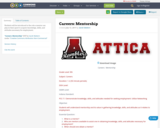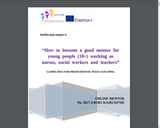
Students will be introduced to the role a mentor can play in their quest to acquire knowledge, skills, and attitudes necessary for employment.
- Subject:
- Career and Technical Education
- Material Type:
- Activity/Lab
- Date Added:
- 07/13/2017

Students will be introduced to the role a mentor can play in their quest to acquire knowledge, skills, and attitudes necessary for employment.

The Guidelines for professional peer coaching is an important tool for strengthening the transition of young people to the integration on the labour market, highly contributing to their development of professional key competences, skills and employability.
The booklet introduces theoretical knowledge to define the concept of professional peer-coaching and to differentiate it from other forms of coaching and work-based learning. It also provides details related to the process of peer-coaching and its benefits on learners, as well as practical guidelines on the way students, volunteers, internship participants and young professional could share their professional experiences, concerns, ideas with colleagues and to provide them guidance, feedback and suggestions.
The guidelines contains a large variety of exercises and practical activities specific for the professional areas of the target groups, respectively helping professions: nurse, teachers, social workers meant to prepare the new and young employees to understand better their role and work responsibilities by collaborative learning.

Surveys social psychology and organization theory interpreted in the context of the managerial environment. Shares lectures with 15.301, with a separate recitation required. 15.301 is intended primarily for non-Sloan students, both graduate and undergraduate. Deals with a number of diverse subjects, including motivation and reward systems for engineers and scientists in industry; the aging of technical groups; the management of R&D matrix organizations; and the architecture of R&D laboratories and its effect on communication patterns in the organization.
15.301 is a core subject for students majoring in management science. A laboratory is a required element of the course for these students. It involves projects of an applied nature in behavioral science. Emphasizes use of behavioral science research methods to test hypotheses concerning organizational behavior. Instruction and practice in communication include report writing, team decision-making, and oral and visual presentation.

We function in our personal and professional lives based on knowledge and intuitions. Our intuition that we know a lot is very powerful. But sometimes intuitions are accurate and sometimes they are not; without research, it is hard to tell.
This course combines a few different goals: develop a critical eye for making inferences from data; be able to carry out simple data analysis; learn about managerial psychology; develop interesting new questions about managerial psychology and test these questions.

The Toolkit to Create a Great Farm Mentorship is a shared drive of resources for farm educators who want to start a mentorship program. The toolkit includes numerous ready-to-use files, but is open source to allow educators to download and edit items as needed. The Toolkit was developed from documents used in the Michigan Sustainable Farm Mentors Program that connect 42 beginning and aspiring farmers with 9 mentors in 2021 and 2022.
This material is based upon work that is supported by the National Institute of Food and Agriculture, U.S. Department of Agriculture, under agreement number 2020-38640-31522 through the North Central Region SARE Partnership grant program, under project number ONC21-085.